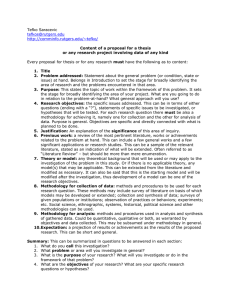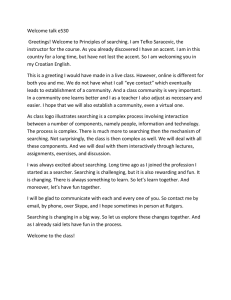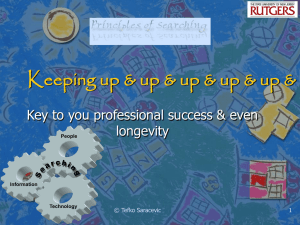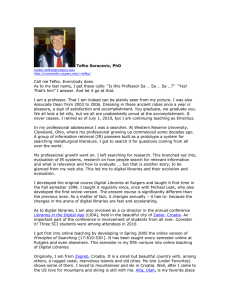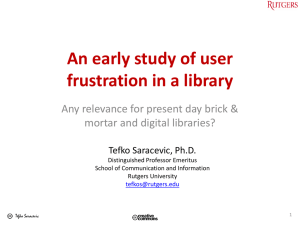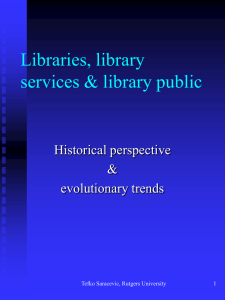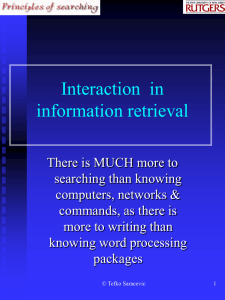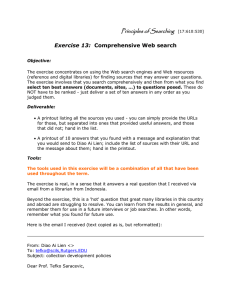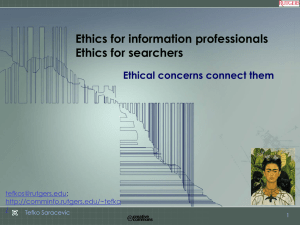Ethics.ppt
advertisement
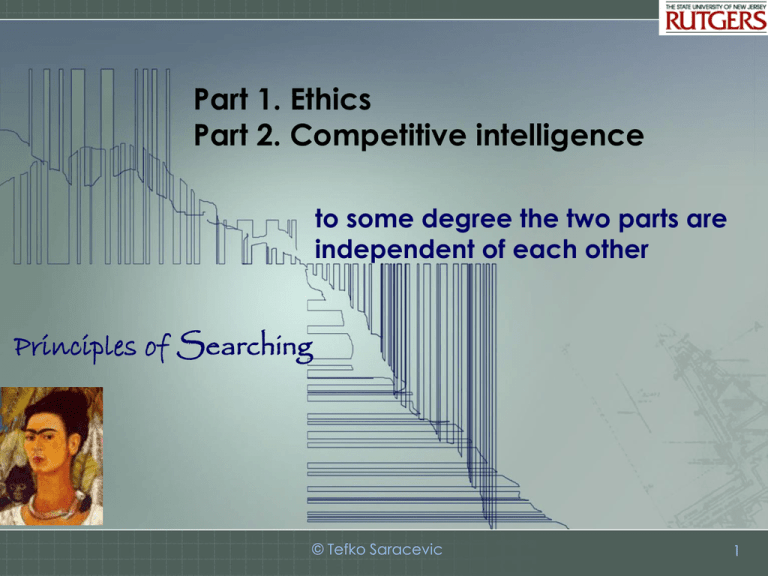
Part 1. Ethics Part 2. Competitive intelligence to some degree the two parts are independent of each other Principles of Searching © Tefko Saracevic 1 Єθοσ [ethos] – Greek word for custom or habit, the characteristic conduct of an individual human life. Definition A Dictionary of Philosophical Terms and Names Why is Ethics important? – Ethics is a requirement for human life. It is our means of deciding a course of action. Sense of Life Objectives. The importance of philosophy © Tefko Saracevic Principles of Searching 2 more … “Ethics is studying and talking about what is right and wrong, good and bad. It is also studying what makes something good or bad. This helps decide whether other things are good or bad. Understanding ethics can help people decide what to do when they have choices. Many philosophers think that doing anything or making any choice is a part of ethics.” Wikipedia P.S. if interested, for an in depth discussion immerse into Stanford Encyclopedia of Philosophy © Tefko Saracevic Principles of Searching 3 Computer ethics more … “Ethics is the field of study that is concerned with questions of value, that is, judgments about what human behaviour is "good" or "bad". Ethical judgments are no different in the area of computing from those in any other area. Computers raise problems of privacy, ownership, theft, and power, to name but a few.” Free online dictionary of philosophy © Tefko Saracevic Principles of Searching 4 Professional ethics “Professional Ethics concerns one's conduct of behaviour and practice when carrying out professional work.” Association for Information Systems. Professional Ethics [site also provides links to a number of code of ethics from different organizations] • Practically every professional organization has an official code of ethics © Tefko Saracevic – but for searchers and searching there is not a single official ethics code – search ethics is derived from other professional codes & practices Principles of Searching 5 Codes of ethics: library & information associations • Library & information science associations have a long standing concern with ethics – examples © Tefko Saracevic – ALA – has a Code of Ethics with basic concern for intellectual freedom – SLA does not have a separate code of ethics but adheres to broad principles – Association of Independent Information Professionals has a Code of Ethical Business Practice – ASIST has Professional Guidelines – Society of Competitive Intelligence Professionals has a brief Code of Ethics for CI Professionals Principles of Searching 6 Principles ALA ethics code • We provide the highest level of service to all library users … • We uphold the principles of intellectual freedom and resist all efforts to censor library resources … • We protect each library user's right to privacy and confidentiality… • We recognize and respect intellectual property rights … • We treat co-workers and other colleagues with respect, fairness and good faith … • We do not advance private interests at the expense of library users, colleagues, or our employing institutions … • We distinguish between our personal convictions and professional duties … • We strive for excellence in the profession by maintaining and enhancing our own knowledge and skills … © Tefko Saracevic Principles of Searching 7 Professional codes of ethics: other associations • Ethical principles of psychologists and code of conduct American Psychological Association Principle A: Beneficence and Nonmaleficence Psychologists strive to benefit those with whom they work and take care to do no harm. … Principle B: Fidelity and Responsibility Psychologists establish relationships of trust with those with whom they work. … Principle C: Integrity Psychologists seek to promote accuracy, honesty, and truthfulness in the science, teaching, and practice of psychology. … Principle D: Justice Psychologists recognize that fairness and justice entitle all persons to access to and benefit from the contributions of psychology and to equal quality in the processes, procedures, and services being conducted by psychologists. … Principle E: Respect for People's Rights and Dignity Psychologists respect the dignity and worth of all people, and the rights of individuals to privacy, confidentiality, and selfdetermination. … © Tefko Saracevic Principles of Searching 8 Another example ACM Code of Ethics and Professional Conduct Association for Computing Machinery “This Code, consisting of 24 imperatives formulated as statements of personal responsibility, identifies the elements of such a commitment.” Among them: As an ACM member I will .... 1.1 Contribute to society and human well-being. 1.2 Avoid harm to others. 1.3 Be honest and trustworthy. 1.7 Respect the privacy of others. 1.8 Honor confidentiality. 2.2 Acquire and maintain professional competence. 2.5 Give comprehensive and thorough evaluations of computer systems and their impacts, including analysis of possible risks. © Tefko Saracevic Principles of Searching 9 • General principles from APA & ACM code can be transferred to searchers Applicability © Tefko Saracevic – instead of “psychologists” put in “searchers” – instead of “computing systems” put in “information systems and resources” Principles of Searching 10 • Searcher competence Some ethical concerns for searchers – evaluating level of service received • Searcher expertise & search results – apprising user & user consent • Searcher bias – tendency toward certain resources • Search accuracy – or rather inaccuracy • Privacy and confidentiality – what goes on in searching stays in searching • Integrity – serving user as opposed to other interests © Tefko Saracevic Principles of Searching 11 Guiding principle © Tefko Saracevic First do no harm Principles of Searching 12 First do no harm! • Your job is to provide information but not judge the uses to which it is put – exception: short of serious imminent threat to another person or society • Your job is to appraise sources & provide information but NOT to give advice on subject matter © Tefko Saracevic – you can provide health information but you are NOT a doctor or psychiatrist to give medical or mental health advice – you can provide plumbing information but you are NOT a plumber [except in your own dwelling, possibly …] – you are NOT Dear Abby Principles of Searching 13 First do no harm! more … • You should know the authority, quality of information sources – not to provide wrong information – appraise user of possible quality problems • You should be aware of user needs, context, limits – to avoid providing information that may be inappropriate & wrongly interpreted, used • You should provide information to user, advise on sources & give informational guidance, but you should not do user's job © Tefko Saracevic Principles of Searching 14 Part 2. Competitive intelligence (CI) Gathering, analyzing & using information in organizations Principles of Searching © Tefko Saracevic 15 What is CI? • Systematic program for gathering and analyzing information about – competitors and their activities – environment - local, national, global – general trends in domains of interest to further organizational goals • Essential for DECISION MAKING • More on Society of Competitive Intelligence Professionals © Tefko Saracevic Principles of Searching 16 Objectives • Collect information – effectively, systematically, economically • Analyze it – appropriately for given contexts, purposes • Disseminate it – to defined users & through effective presentations & channels • Use it – to make informed DECISIONS Tefko Saracevic, Rutgers University Principles of Searching 17 Why is it important? • Increase in complexity – following environment, interconnection • Rapid speed, pace – requirements for faster accomplishments • Information overload – need for analyzing, filtering, focusing • Global competition – rise of global economies and organizations Tefko Saracevic, Rutgers University Principles of Searching 18 Why is it important? (cont.) • Competition more aggressive – capitalizing on conditions, weaknesses • Effects of political changes – national, international laws, conditions, regulations - wide, forceful • Technological changes – rapid; many breakthroughs Tefko Saracevic, Rutgers University Principles of Searching 19 Process cycle Planning, direction: USERS Collection Dissemination Analysis Tefko Saracevic, Rutgers University Principles of Searching 20 Planning, direction: USER based • Identification of users – their characteristics; information needs • • • • • What information needed, required? Monitoring changes in need Evaluation of direction Continuous improvement provisions Economics: costs, effort involved Tefko Saracevic, Rutgers University Principles of Searching 21 Collecting information • Gathering, acquiring information • Primary sources: – experts, customers, suppliers, key staff members & specialists, consultants … • Secondary sources: – databases, publications, reports, industry analyses, publications generated by competitors - print & electronic • Public domain information – vast; highly diversified sources - have to know Tefko Saracevic, Rutgers University Principles of Searching 22 Examples of sources • Primary sources – annual reports; government documents; speeches; TV & radio interviews; financial reports; personal observations; scholarly publications; original technical reports ... • Secondary sources – databases; directories; newspapers; magazines; press releases; analyst reports; trade show materials; projections; forecasts ... Tefko Saracevic, Rutgers University Principles of Searching 23 Analysis of information • Assessment of quality, reliability, accuracy • Identification of key, relevant elements • Macro & micro analysis – search for & modeling of patterns, – hypotheses formulation and testing, e.g. ifthen • SWOT analyses: – Strengths. Weaknesses. Opportunities. Threats. • Identification of need for further information Tefko Saracevic, Rutgers University Principles of Searching 24 Dissemination/communication • • • • Determining effective presentation Packaging; focusing; timeliness Choice of channels Understanding preferences of decision makers • Adjustment to the requirements & culture of organization, and individuals or groups • Follow-up; evaluation • Feedback to other processes Tefko Saracevic, Rutgers University Principles of Searching 25 Ethical concerns • What goes on in practice of collecting information? – legal & illegal practices fairly well defined – but if it is legal is it also ethical? – increase in competition - incentive to cut corners • Need to formulate & adhere to code of ethics – several are formulated as reviewed Tefko Saracevic, Rutgers University Principles of Searching 26 Examples of unethical practices – camouflaged questioning – “drawing out” of competitors’ employees at meetings or encounters – direct observation under secret conditions – false job interviews of competitors’ employees – hiring a professional investigator for specific information – hiring employees away from competitors to get specific know-how Tefko Saracevic, Rutgers University Principles of Searching 27 Examples of illegal practices – trespassing on competitor’s property – bribing competitor’s employee or supplier – “planting” your agent on competitors payroll – eavesdropping on competitor (e.g. wiretapping – theft of documents, drawings, samples – blackmail & extortion – arranging non-competitive practices among competitors Tefko Saracevic, Rutgers University Principles of Searching 28 Summary • Today competitive intelligence is necessary, even vital for organizations • But it requires commitment, resources • Information professionals need adjustment in – internal knowledge of organizational objectives & decision making – knowledge & competence in collection, analysis & presentation • Ethical & legal issues must be watched Tefko Saracevic, Rutgers University Principles of Searching 29 thank you! © Tefko Saracevic Principles of Searching 30
